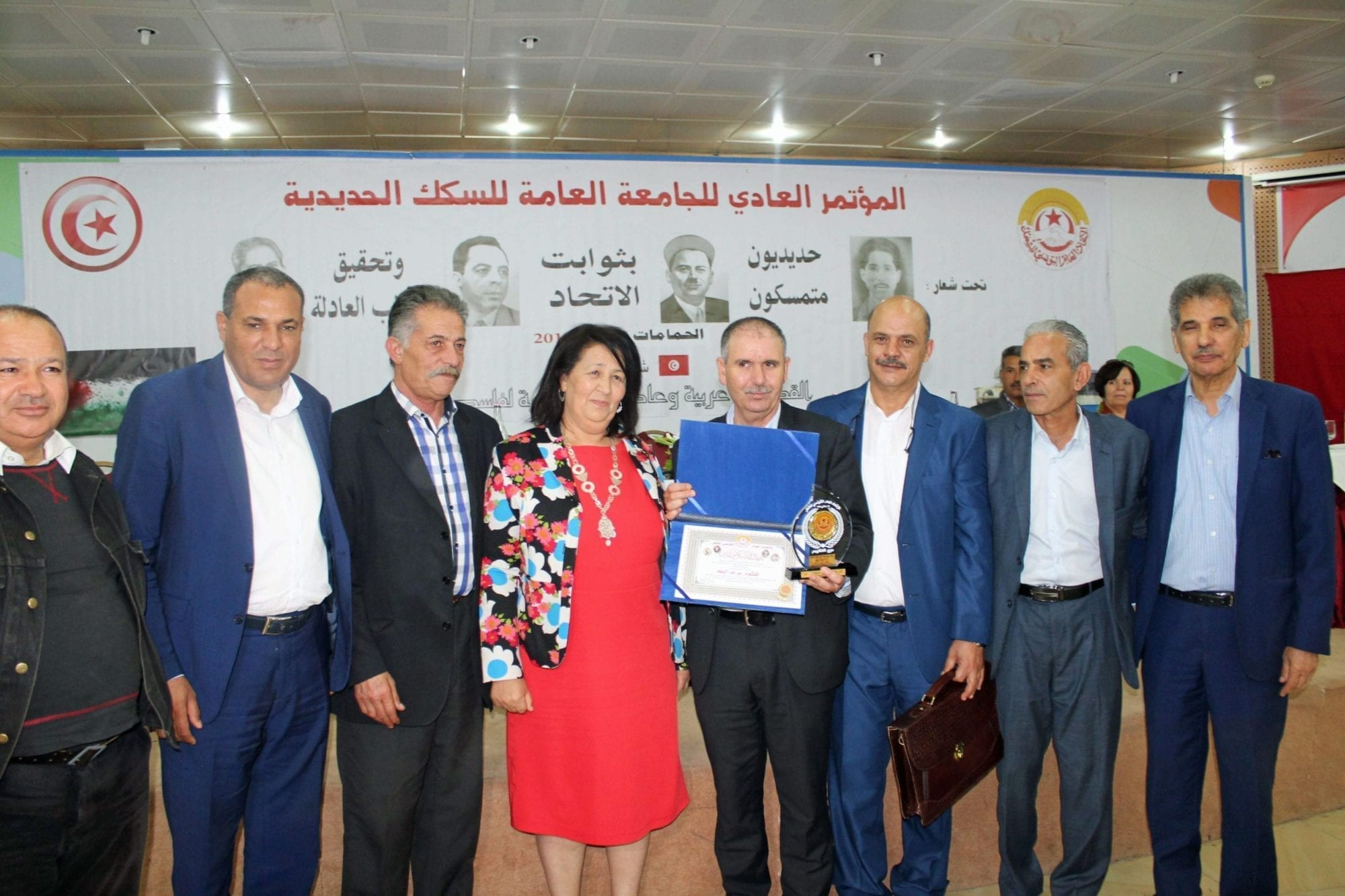
May 9, 2018
Kalthoum Barkallah, Solidarity Center senior program officer and master trainer in Tunisia, this week received a lifetime achievement award from the General Union of Tunisian Workers (UGTT). The award, the nationwide union’s highest honor, is given to union activists for their dedication to union work and in recognition of their struggle in the defense of workers and human rights.

The UGTT award is the union’s highest honor.
“We are enormously proud of Kalthoum and the great contribution she brings to the labor movement through her incredible dedication and accomplishments,” says Hind Cherrouk, Solidarity Center country program director for the Maghreb region. “Kalthoum’s expertise in nurturing and training new generations of leaders, especially women unionists, has ensured the labor movement in Tunisia and beyond is served by new, skilled union activists.”
Presented by UGTT General Secretary Noureddine Tabboubi, the award reads: “Honoring sister and union activist Kalthoum Barkallah in appreciation for her dedication and perseverance in support for union work.”
In conferring the award, Taboubbi noted Kalthoum’s popularity among the UGTT’s union structures from local to national.
“When I began the struggle for democracy, freedom and the rights of women in 1979, I never for a moment imagined that there would be a day when I would be recognized or honored for my part in realizing these noble objectives,” says Barkallah.
Building Women’s Leadership in Their Unions
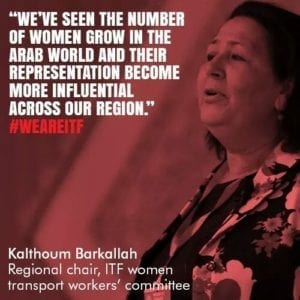 As an activist with the Tunisian General Federation of Railways, Barkallah was first elected as a deputy general secretary in 1983, heading up training within the union. She later was elected deputy general secretary in charge of international relations. In the railways industry, Barkallah was known as the “iron lady” for her determination and struggle to challenge her male colleagues in a male-dominated sector to achieve equality and justice for all.
As an activist with the Tunisian General Federation of Railways, Barkallah was first elected as a deputy general secretary in 1983, heading up training within the union. She later was elected deputy general secretary in charge of international relations. In the railways industry, Barkallah was known as the “iron lady” for her determination and struggle to challenge her male colleagues in a male-dominated sector to achieve equality and justice for all.
As an active union leader with the UGTT, Barkallah built on the gender empowerment training she began in the railway sector to reach union members in a variety of industries throughout Tunisia, championing women’s rights there and supporting her sisters beyond its borders.
Barkallah, who in 2006 was elected president of the International Transport Workers’ Federation (ITF)–Arab Women’s committee, also recently received an award from the ITF Women’s Committee for her fight and struggle in support of women workers in the transport sector.
Throughout her decades of service to workers and their unions, Barkallah balanced both work and family duties, raising two sons who each now have their own children.
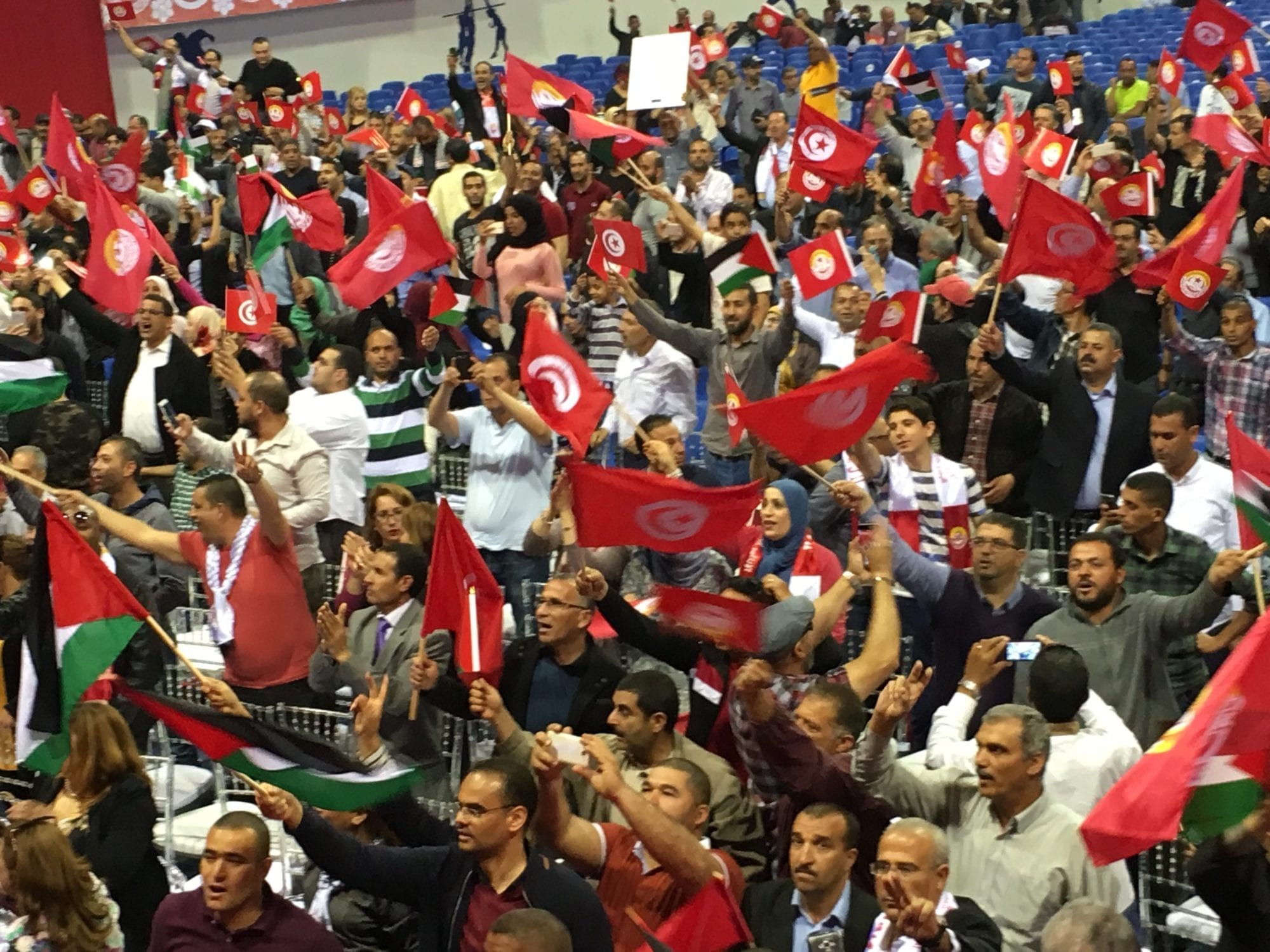
May 1, 2018
Chanting support for their union and for worker rights, more than 7,000 members of the General Union of Tunisian Workers (UGTT) packed the Menzah Sports Palace in Tunis today in a boisterous, enthusiastic May Day celebration.

“We are committed to defend worker rights and workers’ interests and we shall struggle for more justice, equality and freedom”–UGTT Secretary-General Noureddine Tabboubi Credit: Solidarity Center/Tula Connell
“Our principles are to defend the independence of this country and to defend the people of this country,” said UGTT Secretary-General Noureddine Tabboubi. “We are committed to defend worker rights and workers’ interests and we shall struggle for more justice, equality and freedom. We shall combat all forms of abuse and oppresssion.”
In a speech interrupted frequently by chants of “Long live UGTT” and “With blood and with spirit we remain loyal to the UGTT,” Tabboubi outlined the union’s efforts to work with the government in reforming public services without resorting to privatization, a move the union says would lower wages and create precarious jobs and reduce or eliminate access to pensions and health care.

“The UGTT’s priority is for the national interest”–UGTT member Dhouha Kouki Credit: Solidarity Center/Tula Connell
UGTT has been the leading force in protecting democratic gains following the 2011 Tunisian uprising in which workers, outraged at high unemployment and low wages despite the country’s economic prosperity, ousted Tunisia’s dictator, Zine el-Abidine Ben Ali. During the ensuring interim government, UGTT proposed a constitution that included the freedom to form unions and strike, proposals that were maintained when the new constitution was approved.
“In the light of the weakness of the different goverments, the UGTT remained the only reasonable power that ensured stability, but it also ensured a balance between workers and the government,” says Dhouha Kouki, a call center worker and UGTT member who took part in the May Day celebration. “UGTT’s priority is for the national interest.”
As workers waved Tunisan and UGTT flags, some wearing shirts imprinted with the demands of the 2011 uprising–“Employment, Freedom, National Dignity”–Taboubi said: “The goals of our revolution shall be achieved and nobody can confiscate our right to freedom, dignity and social justice.”
Economy Teeters on Crisis

A UGTT member holds a sign reading, “I am a trade unionist and I defend my country and my fellow citizens’ institutions.” Credit: Solidarity Center/Tula Connell
With 750,000 members across Tunisia, UGTT represents mineworkers, textile workers, professional employees and many others, including 75 percent of public-sector employees. The union federation has organized 250,000 members since the 2011 uprising, many of whom were formerly subcontracted government employees with low wages, no access to social benefits or secure employment. UGTT worked with the interim government within a month of the revolution to bring subcontracted workers into full-time employment, says Sami Tahri, secretary-general in charge of information.
Since then, the UGTT, a Solidarity Center partner, negotiated a 6 percent wage increase for private-sector workers in 2012, an 11 percent increase in the mininum wage in 2014, and an improved contract for high school teachers in 2015, according to “Workers and Thieves: Labor Movements and Popular Uprisings in Tunisia and Egypt.”
Yet the increasing number of workers in the informal sector–which represents more than 54 percent of the country’s gross domestic product–lack of investment in job creation, especially by financial institutions, and an official unemployment rate of 16 percent, including 250,000 university graduates in a country of 11.6 million, mean Tunisia is facing an economic crisis, says Tahri.
Workers in the informal economy are “deprived of all their economic rights and have no social protection like paid sick leave or pensions,” he says, speaking through a translator. Tahri says the official unemployment rate is likely much higher because many people are not counted.
Retirees are suffering the most, especially those who worked for private employers, Tahri says. Many private-sector employers do not fully pay into the country’s social security system, resulting in pensions so low that 25 percent of retirees receive less than the minimum wage, and another 30 percent receive only the minimum wage, says Tahri.
Creating a ‘Solidarity Economy’
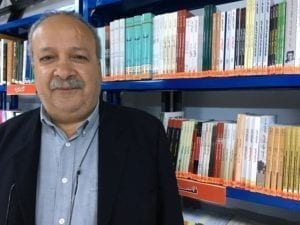
Sami Tahri, UGTT Secretary General in charge of Communications, says UGTT is assisting workers through multiple strategies. Credit: Solidarity Center/Tula Connell
The UGTT is tackling the challenges facing Tunisian workers through organizing and legislative action. In partnership with allied organizations, including the Solidarity Center, UGTT is organizing rural workers in Tunisia’s long-neglected interior, where most of the 1.5 million agricultural workers are women who are not covered by social benefits like pensions and who toil in dangerous and harsh conditions, often into their seventies.
The UGTT also submitted legislation to the national parliament that would create a “solidarity economy” in which the government finances young workers, especially those in agriculture, service and handicrafts, to create their own “start-ups,” with part of the profits returning to the government to fund more new enterprises. By targeting workers in the informal economy, the program also would bring more workers into the social security system, which also is underfunded because there are now five retirees for every one worker. In the 1970s, Tahri says, the ratio was reversed.
Additionally, UGTT has reformed internal union structures to reflect women workers, who comprise the majority of workers in industries such as education, health care and auto parts manufacturing. In 2017, the UGTT Executive Board voted to require executive boards at all levels of the union to include at least two women and better represent its membership.
In 2013, the UGTT was instrumental in brokering a peaceful path to democracy as part of the Tunisian “Quartet,” which was awarded the 2015 Nobel Peace Prize.
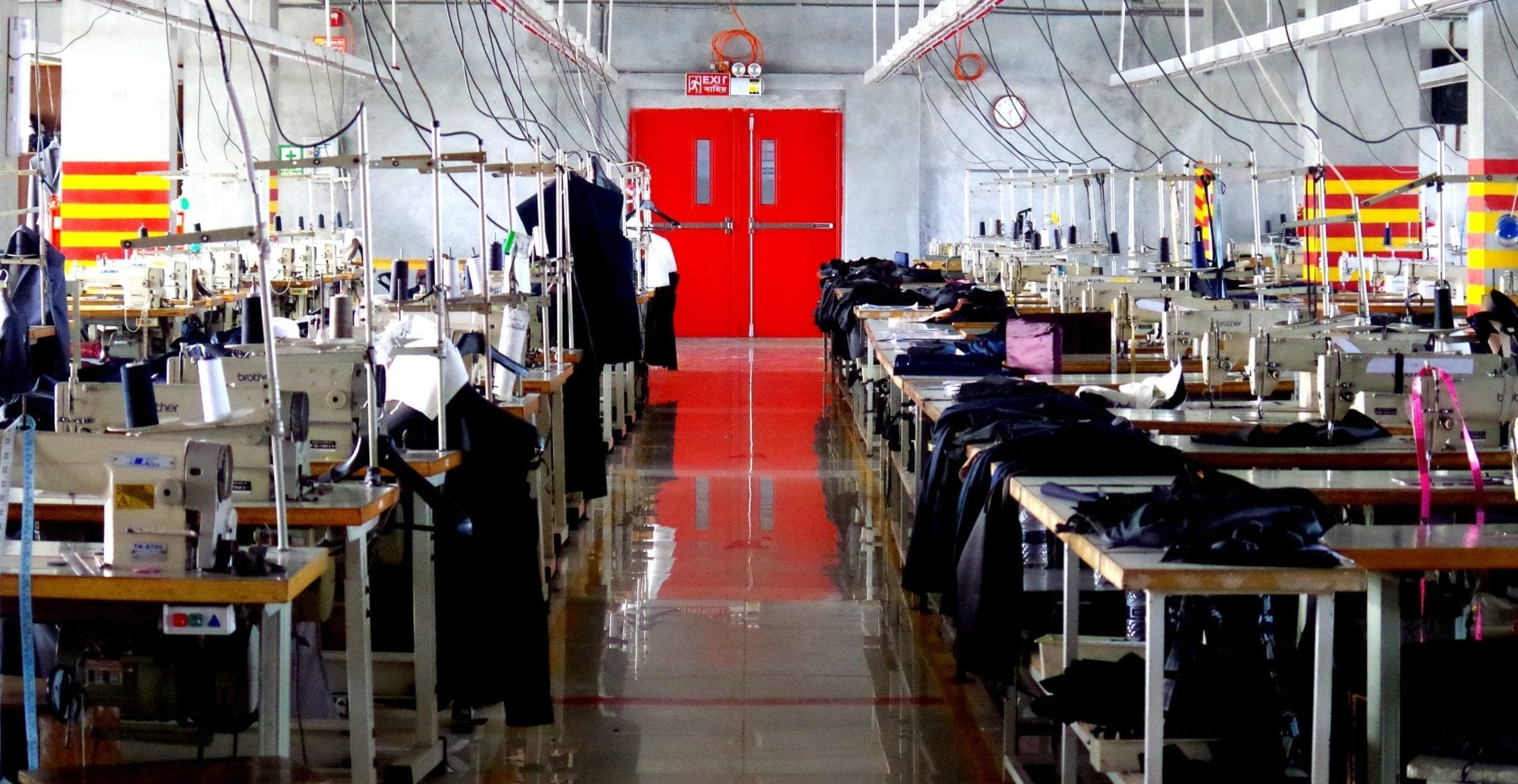
Apr 24, 2018
Approximately 1 in 5 workers worldwide are employed in global supply chains. Millions of them do not have access to decent work and must endure long hours, low wages and hazardous working conditions.
The majority of people working for the world’s biggest multinational corporations are ‘hidden’ in subcontracted work around the globe. Without global rules governing supply chains, multinational corporations are rarely held accountable for violating worker rights in places around the world.
The Solidarity Center partners with unions and other organizations to educate workers about their rights on the job and to empower them with the tools they need to improve their workplaces together.
Learn more about the Solidarity Center’s work in the global garment industry
IN THE NAME OF FASHION
The global garment industry that produces the world’s clothes employs as many as 75 million workers. Garment workers’ earnings usually fall well below the living wage for the urban areas where their factories are located.
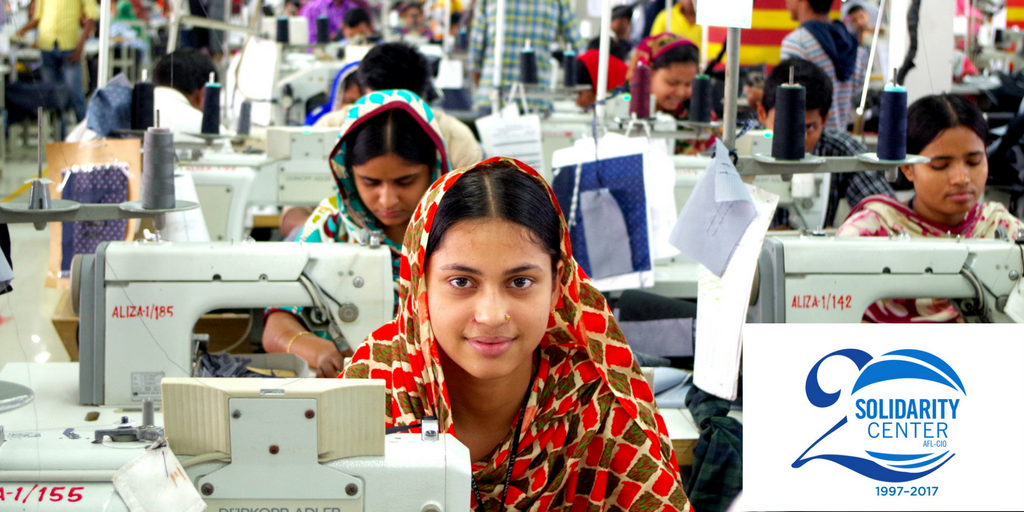
Garment workers in Gazipur, Bangladesh. Credit: Solidarity Center
DISASTER STRIKES TAZREEN
Poverty isn’t the only problem for garment workers. Hazardous working conditions and poor safety measures put the lives of millions of garment workers around the world at risk for the sake of fashion.
On November 24, 2012, a massive fire tore through the Tazreen Fashions Ltd. factory in Dhaka, Bangladesh, killing more than 100 garment workers and gravely injuring thousands more.
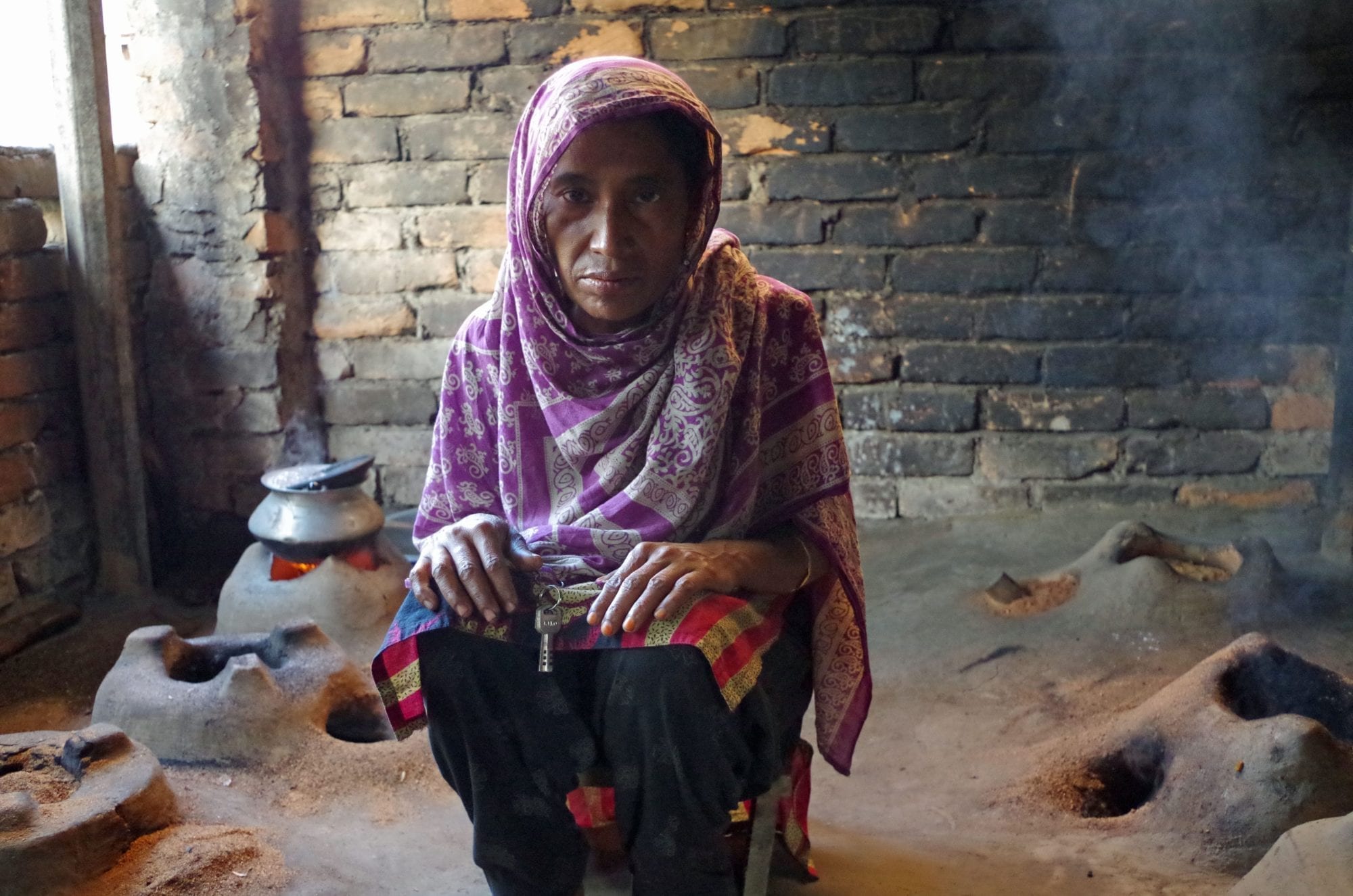
Anju, a Tazreen factory fire survivor, suffered severe injuries but never received compensation. Credit: Solidarity Center/Mushfique Wadud
Just five months later, more than 1,000 garment workers were killed and more than 2,500 were injured when the Rana Plaza garment factory building collapsed outside of Dhaka.
A structural engineer had already declared the building structurally unsafe and had demanded it be closed, but workers were told to show up anyways or else risk losing their jobs.
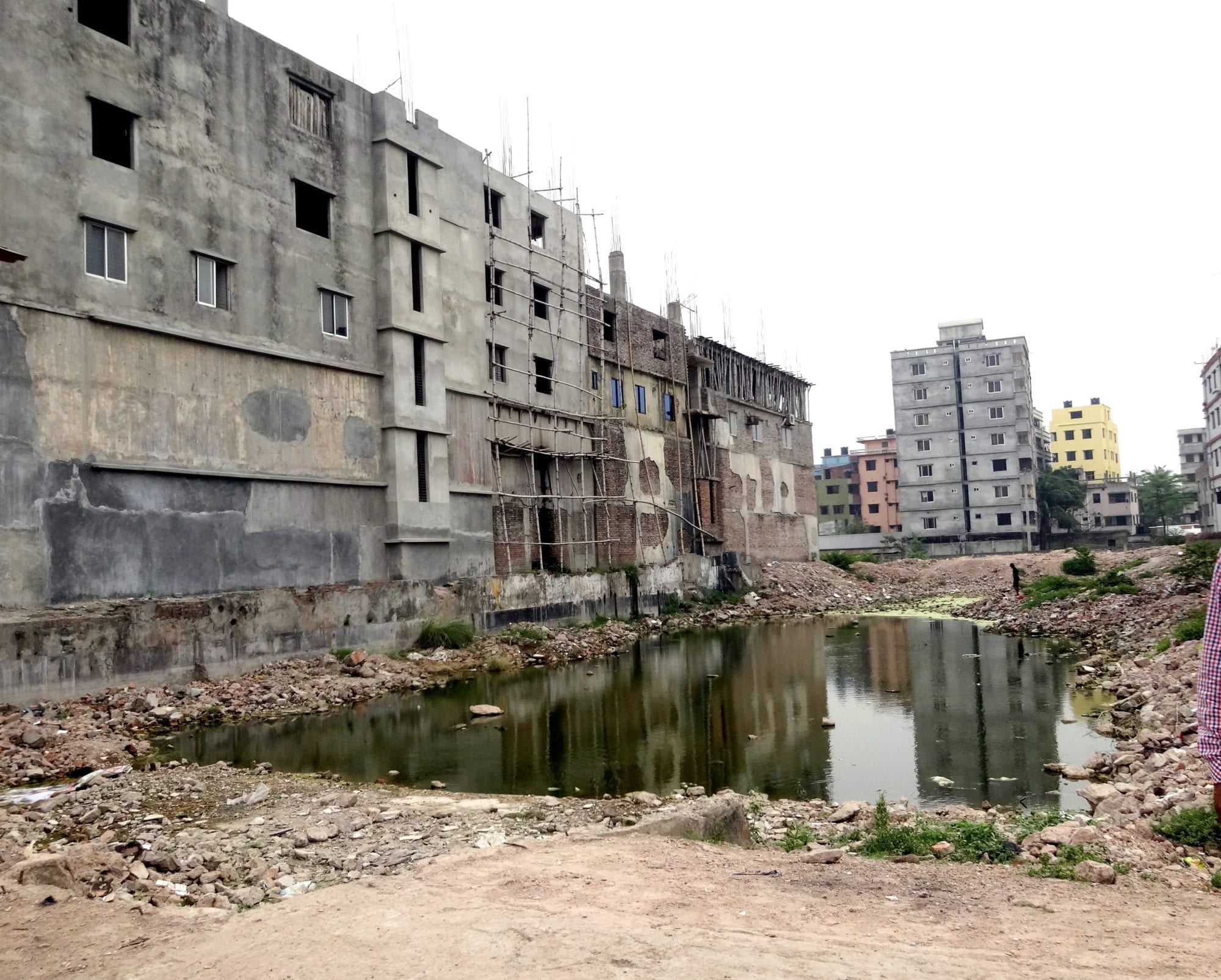
The site of the Rana Plaza building two years after it collapsed. Credit: Solidarity Center
While the Tazreen fire and the Rana Plaza collapse were catastrophic, they are not isolated incidents.
In the four years following Tazreen, fires, building collapses and other tragedies have killed or injured more than 4,800 garment workers in Bangladesh, according to data collected by the Solidarity Center.
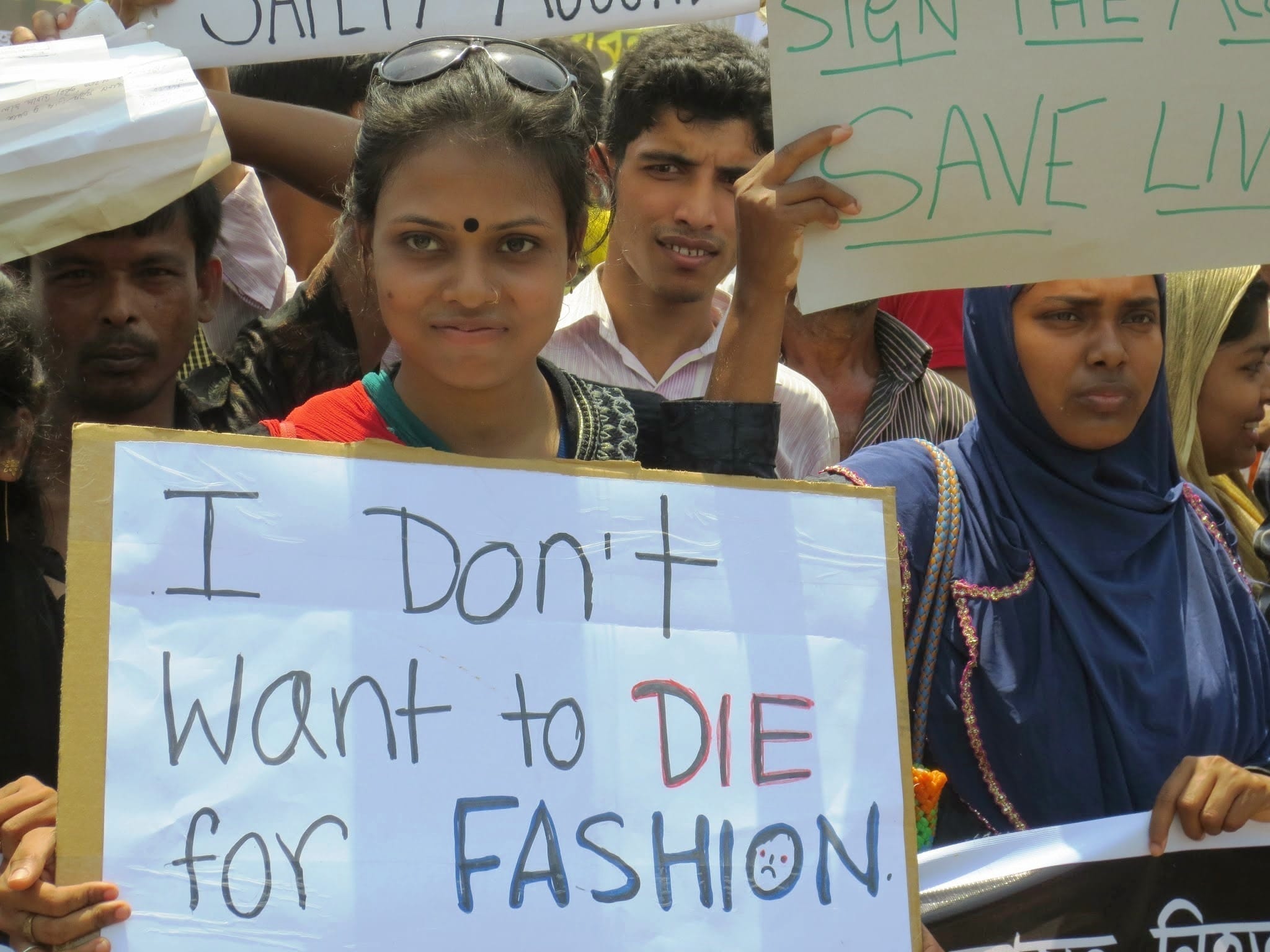
A young woman protests garment worker deaths in Bangladesh. Credit: Solidarity Center/Sifat Sharmin Amita
WORKERS DEMAND CHANGE
In the wake of these disasters, garment workers throughout Bangladesh are standing up for their rights to safe workplaces and living wages. Workers have staged rallies to demand that multinational corporations respect their human rights.
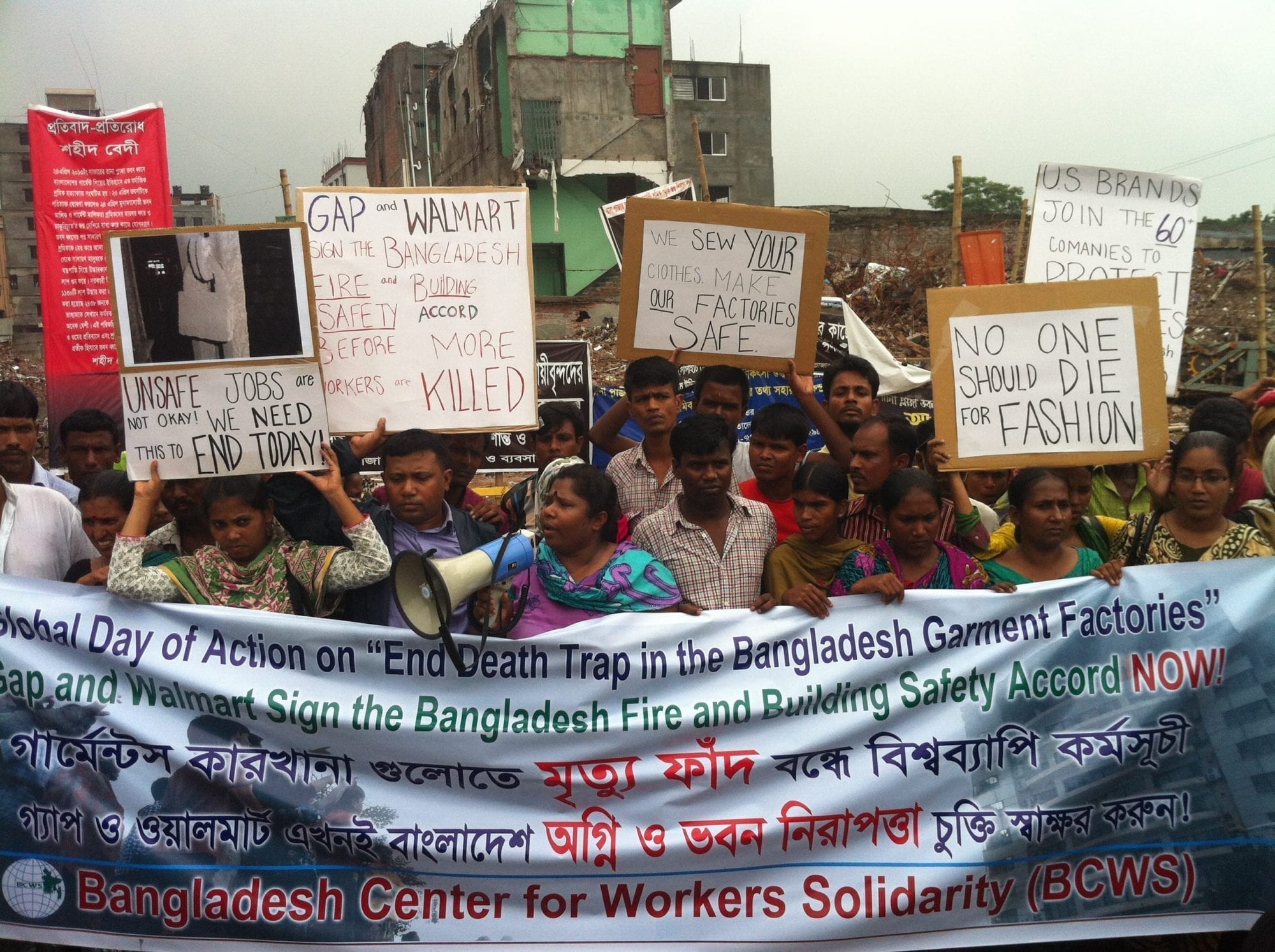
Tens of thousands of workers rallied on the one-year anniversary of the Rana Plaza disaster. Photo: Solidarity Center/Sifat Sharmin Amita
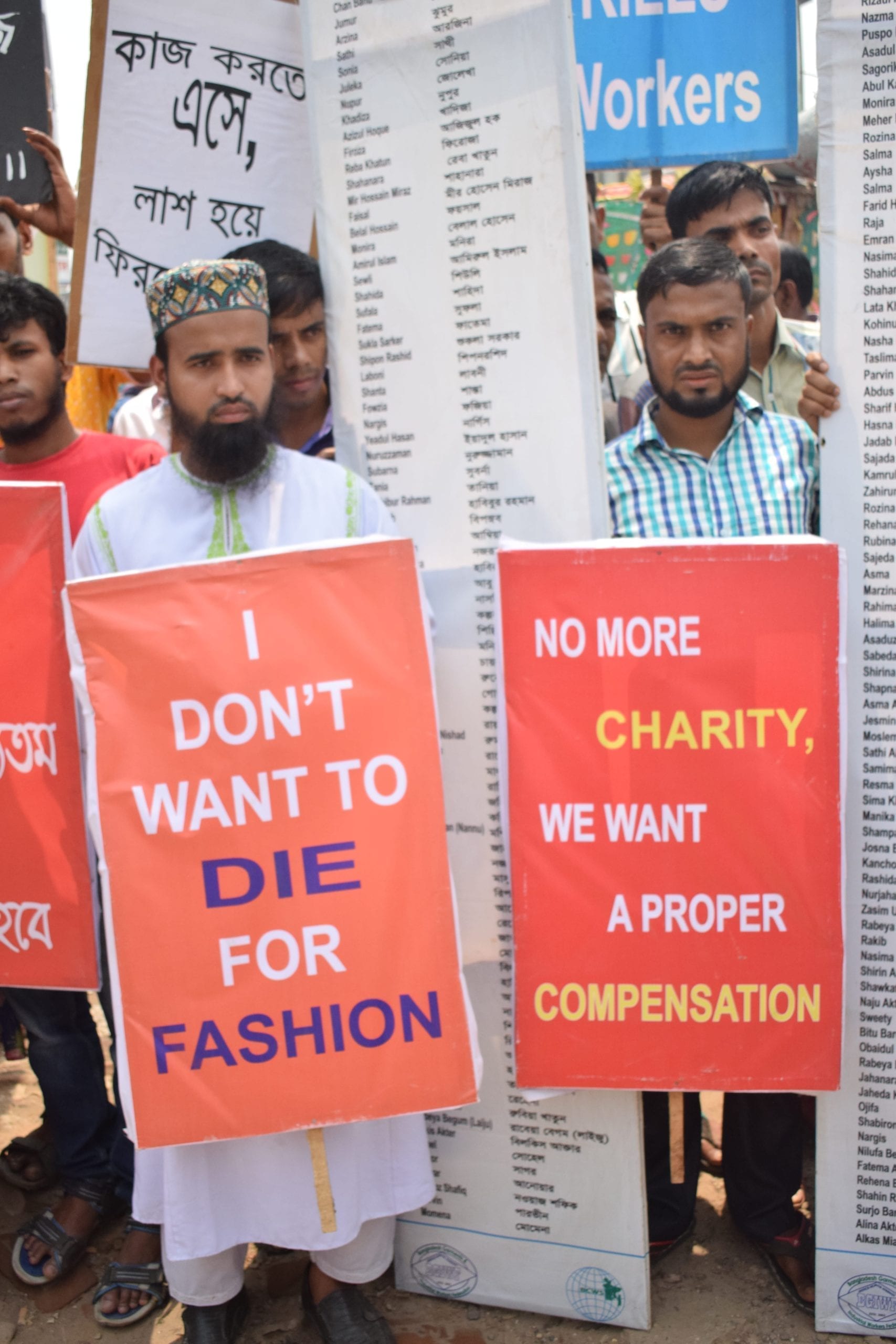
Workers and loved ones protest in Bangladesh at the Rana Plaza five-year anniversary rally. Credit: Solidarity Center/Musfiq Tajwar
The invisibility of garment workers and their struggles makes it difficult for them to hold big clothing brands accountable.</p> <p>The subcontracting process in global supply chains obscures human rights abuses and distances workers from the multinational corporations for whom they produce.
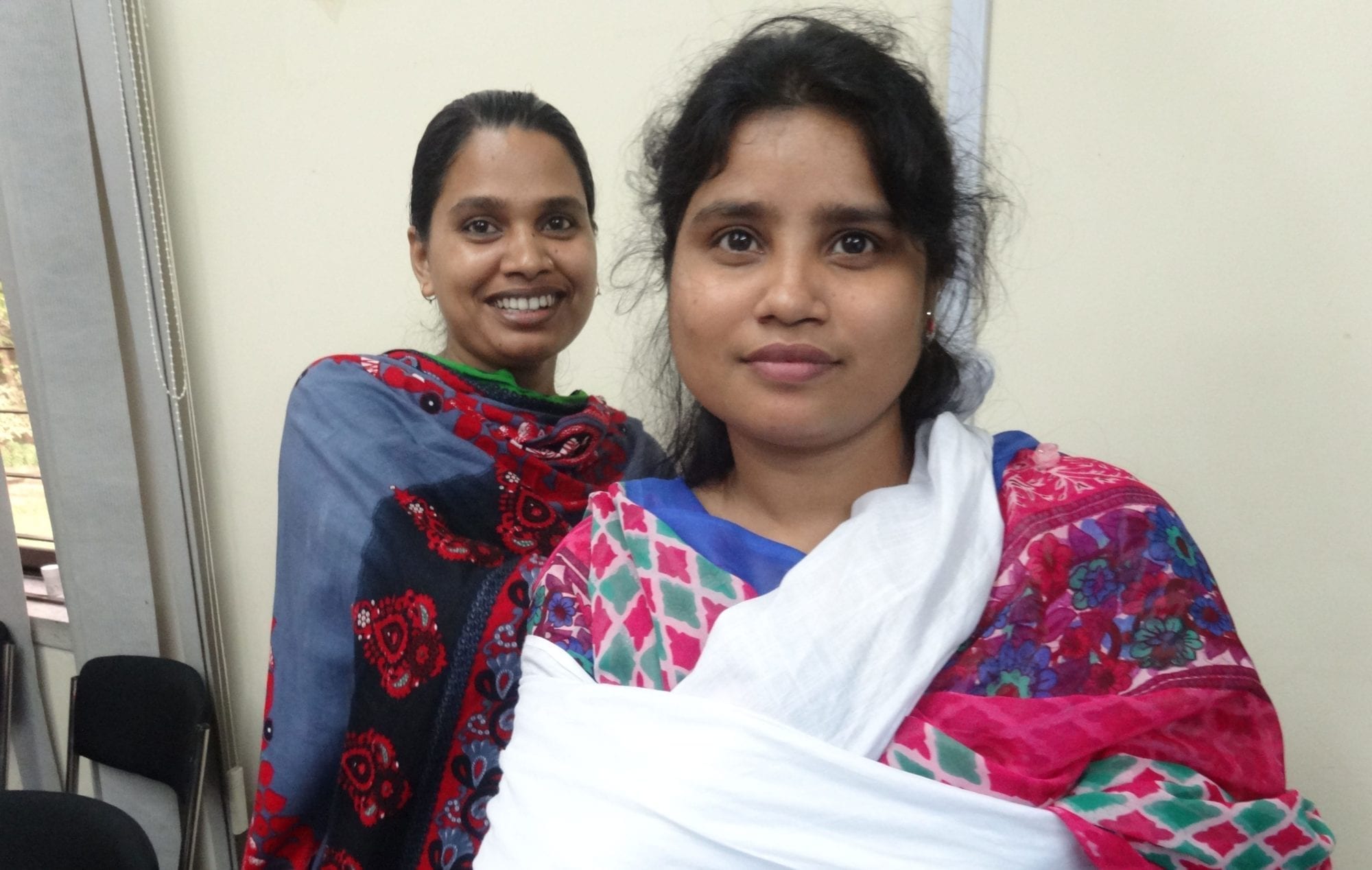
Credit: Solidarity Center/Rakibul Hasan
WORKERS STAND TOGETHER
Worker disenfranchisement also isolates individual workers and makes it harder for them to stand up for their rights. Garment workers who try to speak out about unsafe working conditions often fear retaliation from their employers, including violence, threats or even being fired.
Unions have helped to change that.
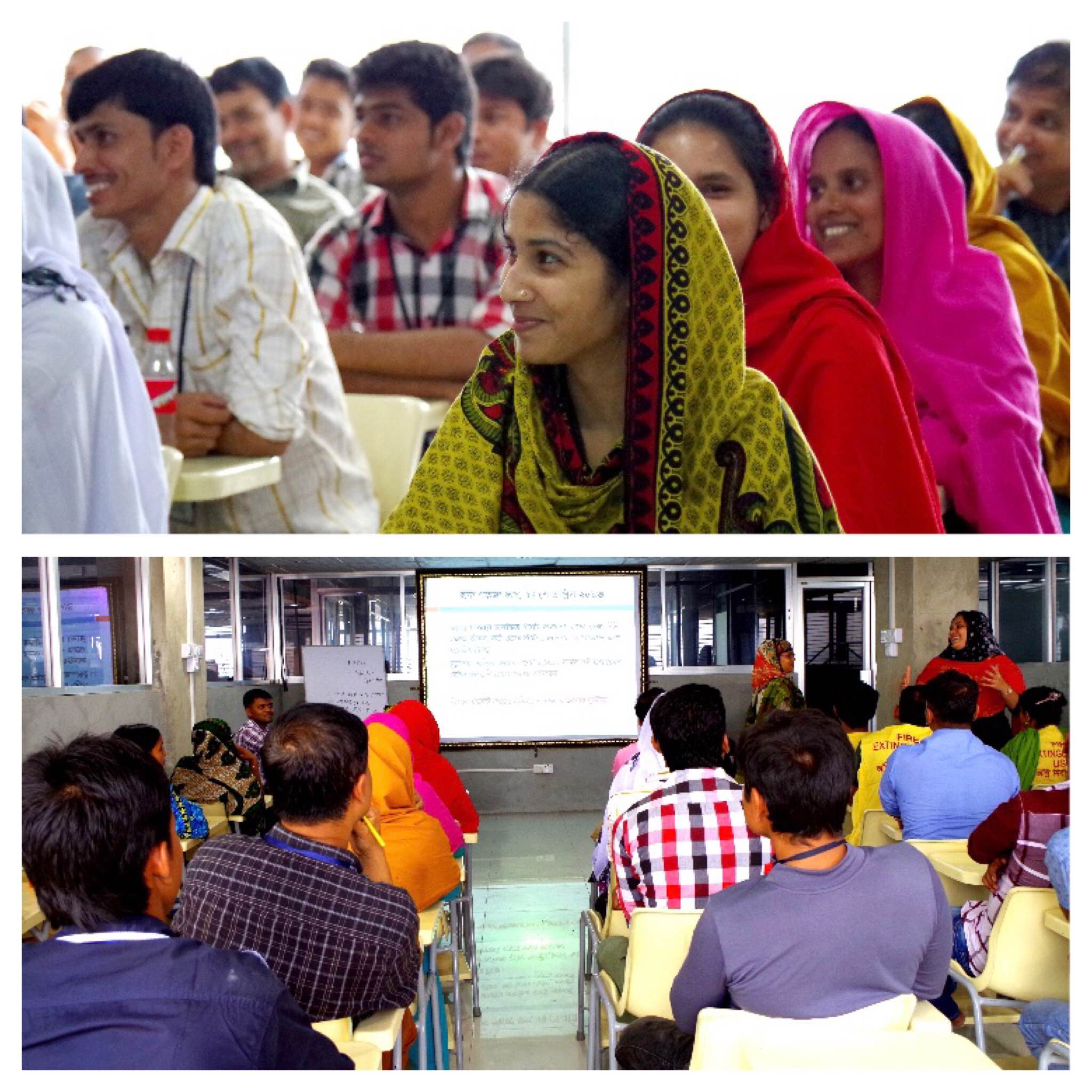
The Solidarity Center partners with numerous unions and worker associations in Bangladesh. Credit: Solidarity Center
UNIONS SAVING LIVES
Worker voices have yielded real results. The 2013 Accord on Fire and Building Safety in Bangladesh provides legally binding means for unions to hold multinational clothing brands accountable for protecting the lives and rights of workers in their supply chains.
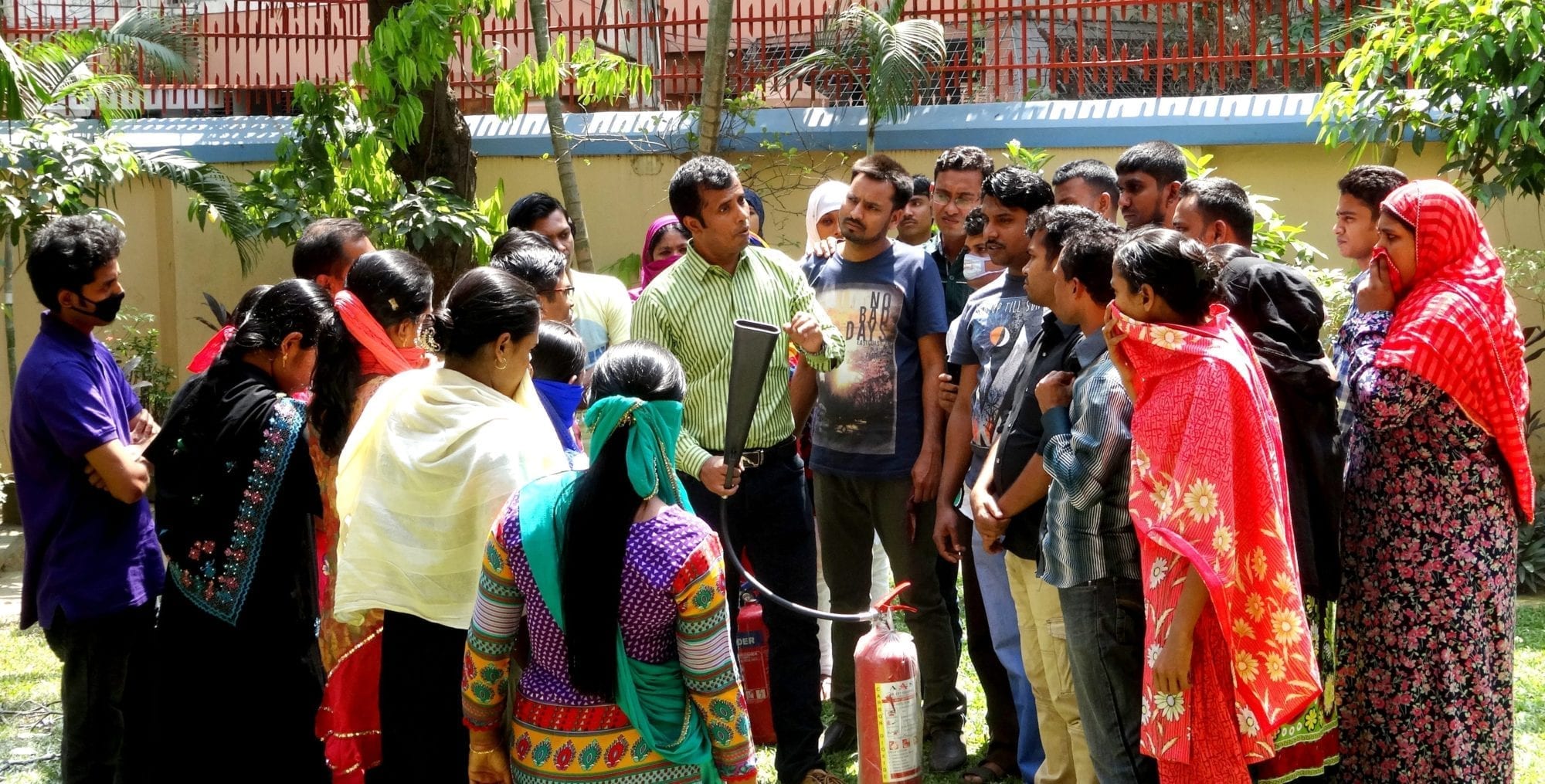
Union leaders participate in the Solidarity Center’s 10-week fire safety certification course. Credit: Solidarity Center
The Solidarity Center also provides training for workers, union leaders and factory managers to learn about fire and building safety codes, practice emergency response procedures and gain hands-on experience using fire extinguishers and other tools for saving lives.
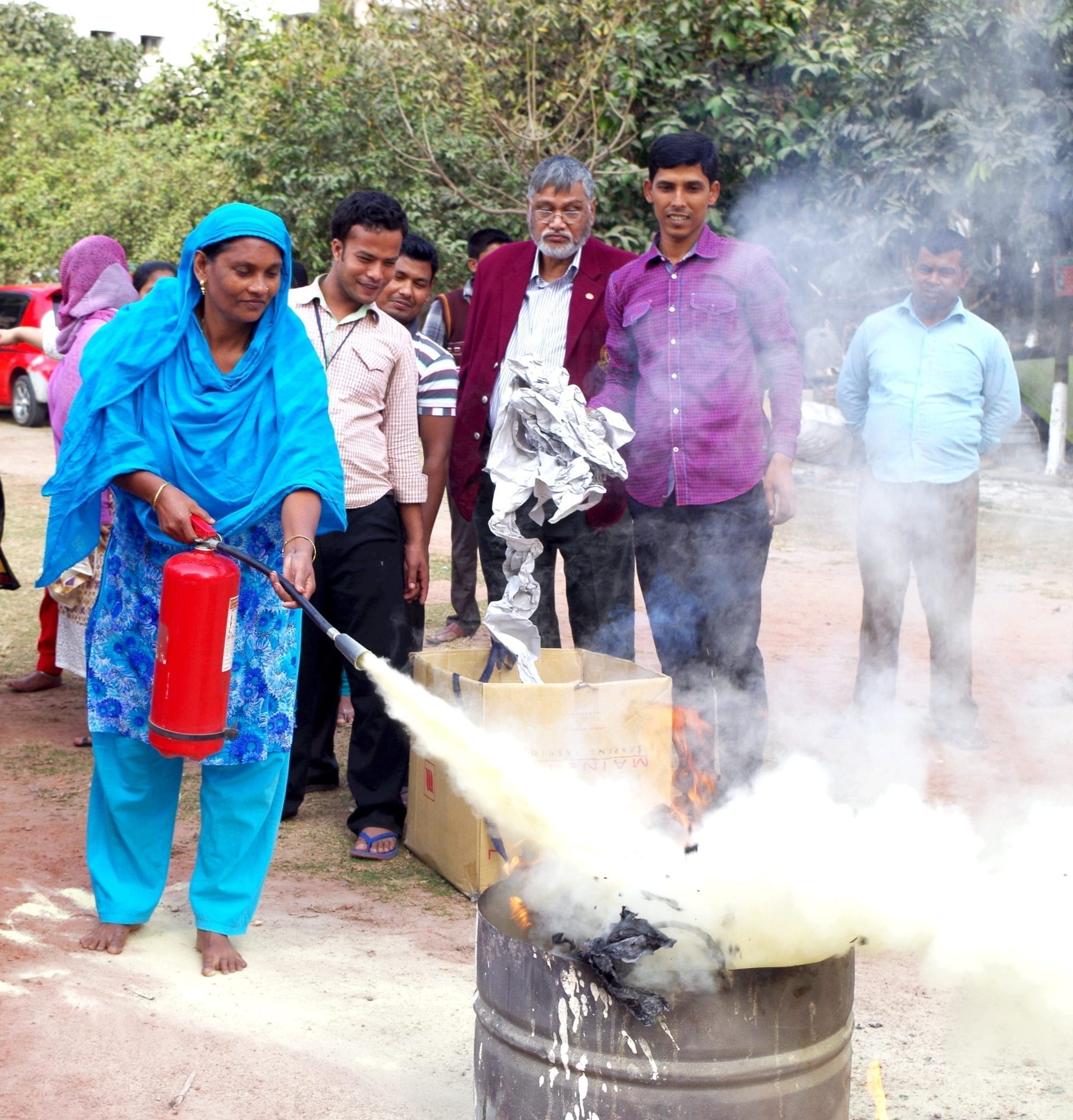
Garment workers learn fire safety and other measures to improve their working conditions. Credit: Solidarity Center
INVISIBLE NO LONGER
As workers strengthen their collective voice in their workplaces and beyond, their hard work, their lives and their humanity become visible once more.
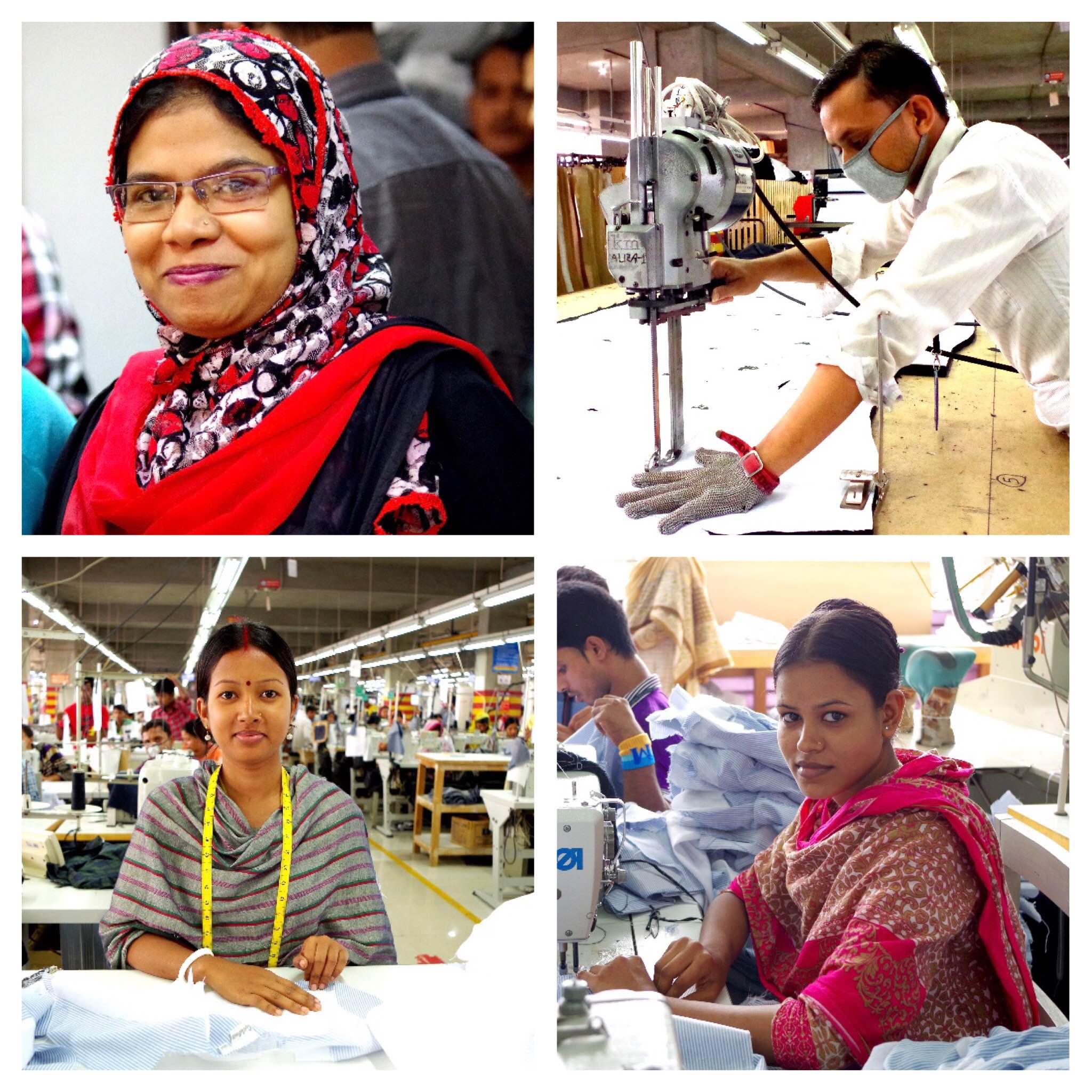
Bipasha, Quality Inspector (bottom left). Rina, Operator (bottom right) . Ratan, Tailor (top right). Credit: Solidarity Center
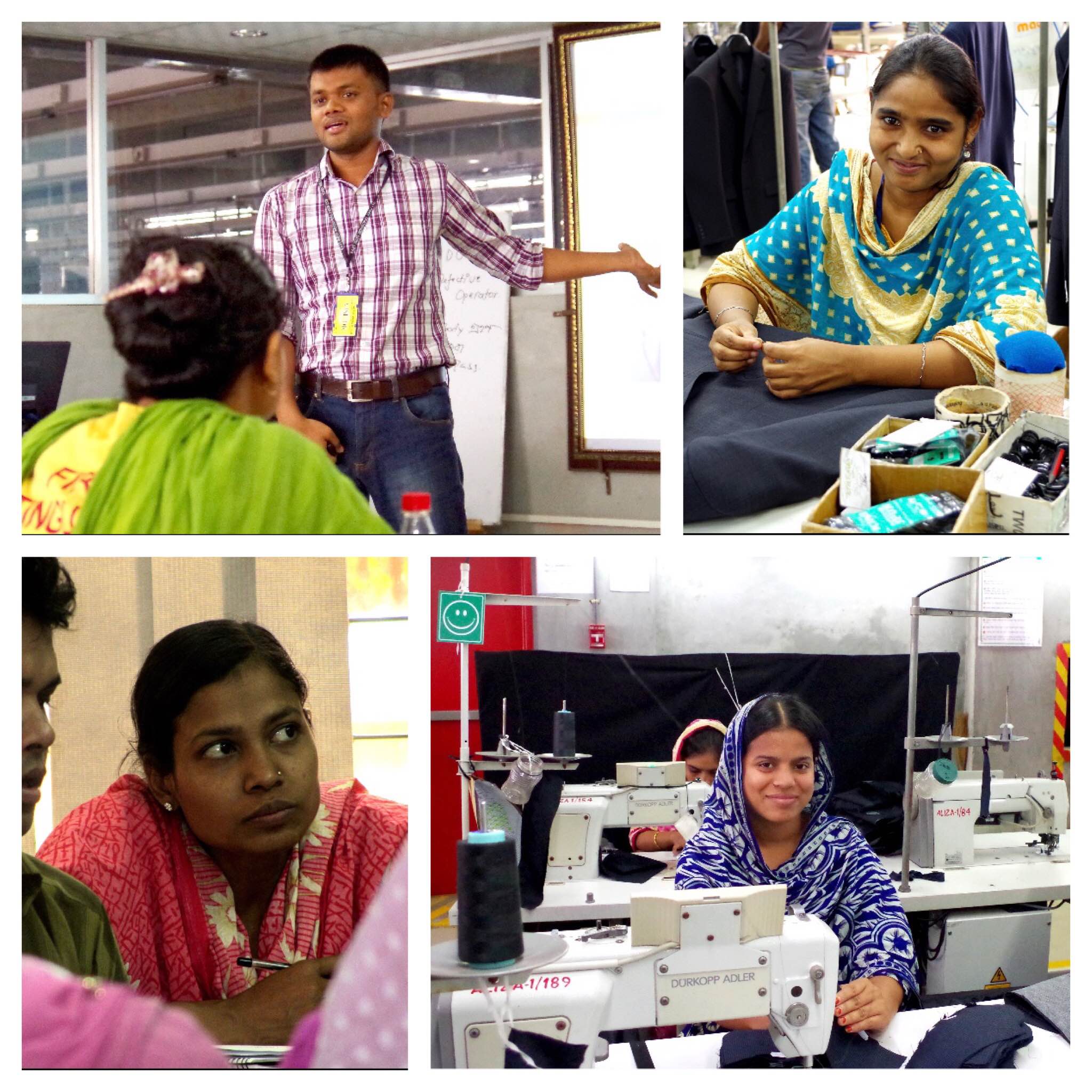
Mahfuza, Assistant Operator (top right). Sharifa, General Operator (bottom right). Credit: Solidarity Center
To learn more about garment workers in global supply chains and how the Solidarity Center supports them, visit solidaritycenter.org.
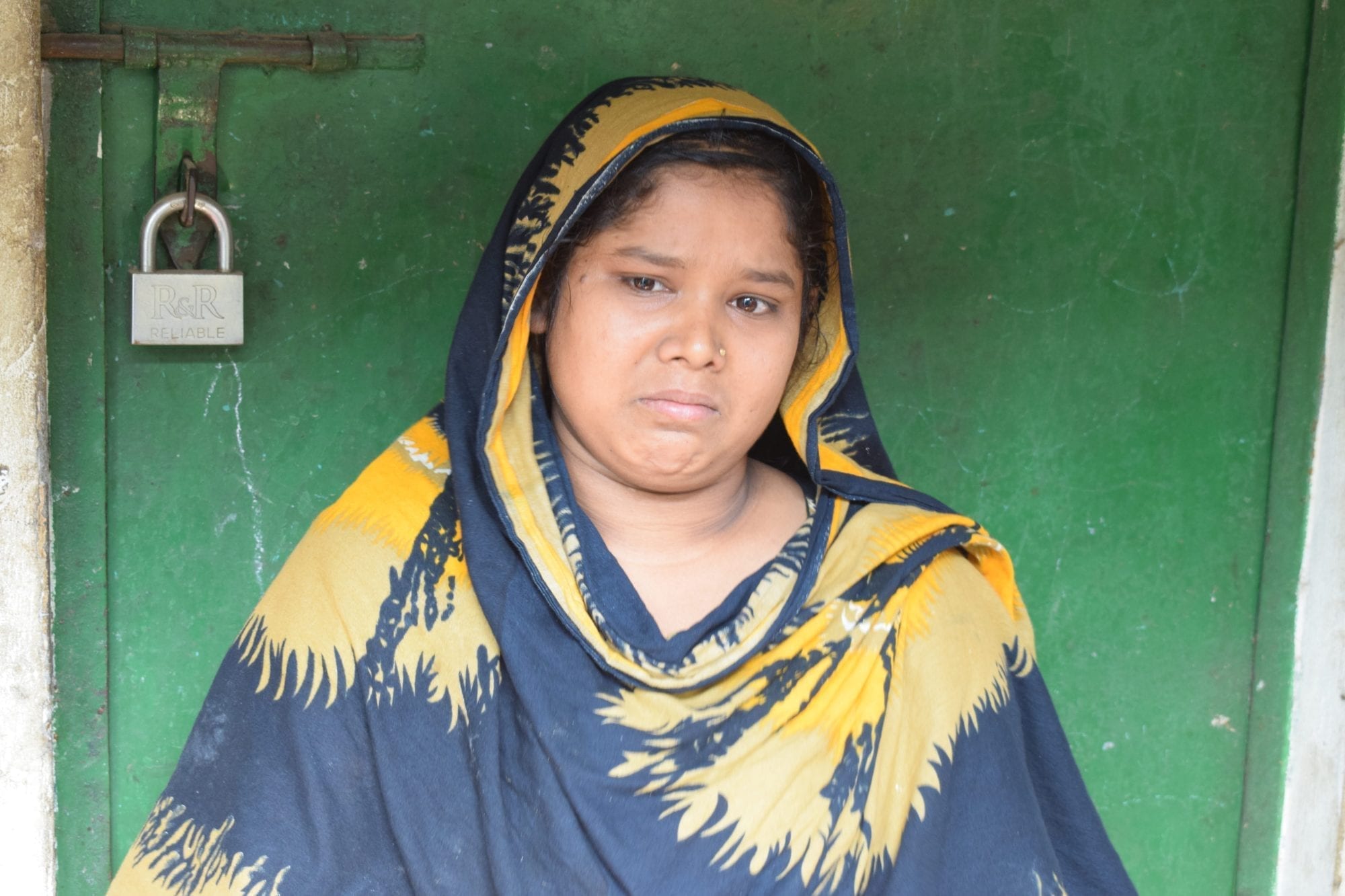
Apr 15, 2018
Following the Rana Plaza collapse in which 1,134 garment workers were killed and thousands more injured in Bangladesh, the horror of the incident spurred international action and resulted in significant safety improvements in many of the country’s 3,000 garment factories.
But five years after the April 24, 2013, disaster, Bangladesh garment worker-organizers say employers often are not following through to ensure worksites remain safe, and the government is doing little to ensure garment workers have the freedom to form unions to achieve safe working conditions. Since the Tazreen Factory fire that killed 112 garment workers in 2012, some 1,303 garment workers have been killed and 3,875 injured in fire-related incidents, according to Solidarity Center data.
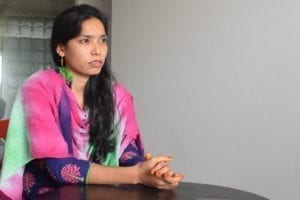
“Five years after the tragedy, the police and local leaders are supporting the factory owners and harassing us”—Tomiza, worker-organizer. Credit: Solidarity Center/Mugfiq Tajwar
“Pressure from the buyers and international organizations forced many changes, says Tomiza Sultana, a garment worker-organizer with the Bangladesh Independent Garment Workers Union Federation (BIGUF), among them less interference by police and factory management. “ We organized trade unions, recorded complaints and trained many workers.
“But five years after the tragedy, the police and local leaders are supporting the factory owners and harassing us and anyone who wishes to come to us. They have forgotten the lessons of the disaster,” she says.
A Disaster that ‘Cannot Be Described in Words’
“I can vividly recall that day. I can still see the faces of families who were looking for the bodies of their loved ones by only holding their photo ID,” says Nomita Nath, BIGUF president. “This disaster cannot be described in words.” The multistory Rana Plaza building, which housed five garment factories outside Dhaka, pancaked from structural defects that had been identified the day before, prompting building engineers to urge the building be closed. Garment workers who survived the collapse say factory managers threatened their jobs if they did not return to work.
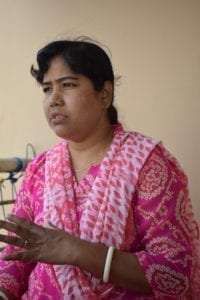
Factory owners did not care about our lives. They only cared about meeting production targets—BIGUF President Nomita Nath. Credit: Solidarity Center/Mugfiq Tajwar
Ziasmin Sultana, a garment worker who survived the collapse, recalls managers telling workers on the morning of April 24 the building was safe even though “the previous day, we had seen cracks [in the building] form right in front of our eyes.” Shortly after starting work, the electricity went out and the building began to violently shake.
After packing into a crowded stairwell to escape, Ziasmin says she found herself falling. “Everything happened in an instant and it was dark everywhere. When I came to my senses, I realized that three of us have survived and everyone else around us was dead.”
“The world saw how much our lives meant to the owners of these factories,” says Nomita. “They did not care about our lives. They only cared about meeting production targets.”
In the wake of Rana Plaza, which occurred months after a deadly factory fire at Tazreen Fashions killed 112 mostly female garment workers, global outrage spurred several international efforts to prevent deaths and injuries due to fire or structural failures. Safety measures were instituted at more than 1,600 factories.
Hundreds of brands and companies signed the five-year, binding Bangladesh Accord on Building and Fire Safety which mandated that brands and the companies they source from fix building and fire hazards and include workers in the process. Many of the signatories recently have signed on to the renewed three-year agreement that takes effect in May. Extending the Accord guarantees that hundreds of additional factories will be inspected and renovated.
Workers Still Struggle to Achieve Safe Workplaces
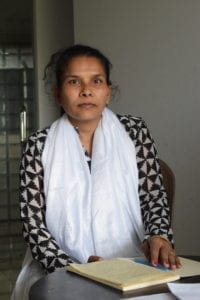
Maintaining the safety gains made after Rana Plaza is “a big task,” says Khadiza Akhter. Credit: Solidarity Center/Mugfiq Tajwar
In a recent series of Solidarity Center interviews, garment worker-organizers from several national unions applaud the significant safety improvements but warn that employers are backsliding. And workers seeking to improve safety in their factories often face employer intimidation, threats, physical violence, loss of jobs and government-imposed barriers to union registration.
“The Accord contributed to ensuring the safety of the factories, but there is a lot of other work that needs to be done,” says Khadiza Akhter, vice president of the Sommilito Garments Sramik Federation (SGSF). She and others interviewed say factories are not regularly inspected, employers do not ensure fire extinguishers and other safety equipment are properly maintained, and safety committees sometimes only exist on paper.
“We are now working in this area for maintaining the standard of fire safety. This is a big task in coming future,” Khadiza says.
The Solidarity Center, which over the past two decades in Bangladesh jump-started the process to end child labor in garment factories and served as a catalyst in the resurgence of workers forming unions, in recent years has trained more than 6,000 union leaders and workers in fire safety. Factory-floor–level workers learn to monitor for hazardous working conditions and are empowered to demand that safety violations be corrected. Many workers, in turn, share their knowledge with their co-workers.
Bangladesh at a Crossroads
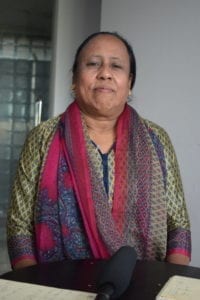
Garment workers can barely survive with such low wages—Momotaz Begum, worker-organizer. Solidarity Center/Mugfiq Tajwar
Accounting for 81 percent of the country’s total export earnings, Bangladesh’s ready-made garment industry is the country’s biggest export earner. Yet wages are the lowest among major garment-manufacturing nations, while the cost of living in Dhaka is equivalent to that of Luxembourg and Montreal.
“The workers can barely survive with such low wages, as their house rents and even food prices have risen,” says Momotaz Begum, who has worked as a garment worker organizer with the Awaj Foundation since 2008.
Without a union, garment workers often are harassed or fired when they ask their employer to fix workplace hazards or seek living wages. Worker advocates say Bangladesh is at a crossroads—and they hope the government and employers choose a future in which Bangladesh workers are partners in the country’s economic success and treated with the dignity and respect they deserve.
But even in the face of severe employer harassment and government indifference, worker-organizers like Khadiza, Momotaz, Tomiza and Nomita, all of whom began working in garment factories as children or young teens, are helping workers join together and insist on their rights at work. Today, 445 factories with more than 216,000 workers have unions to represent their interests and protect their rights.
“I believe that the workers must be aware of their rights and they must be united to achieve them,” says Shamima Akhter, an organizer with the Bangladesh Garment and Industrial Workers’ Federation (BGIWF). “We train them to let them know what they deserve, and we empower them so that they can claim their rights from the factory owners.”
In Bangladesh, the Solidarity Center implements the Workers Empowerment Program – Components 1 and 2, which provides training and rights education to garment workers and organizers, with the support of USAID.
Iztiak, an intern in the Solidarity Center Bangladesh office, conducted the interviews in Dhaka.
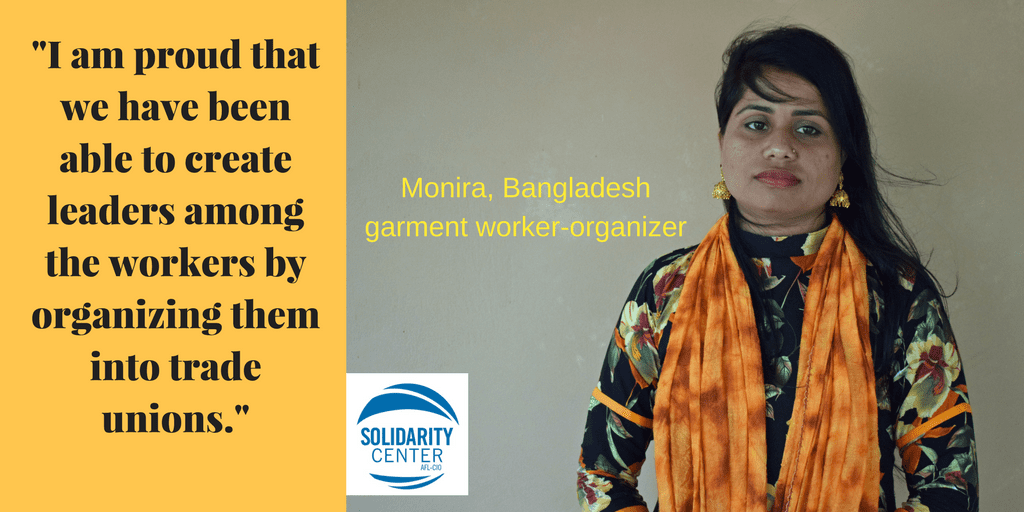
Apr 9, 2018
Five years after the deadly Rana Plaza building collapse in Bangladesh, workers and union activists say despite the massive demand from workers for union representation to achieve safe workplaces, worker-organizers must face down threats, harassment and violence to educate workers about their rights on the job.
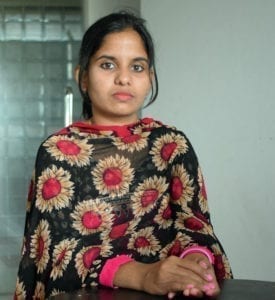
Shamima Aktar is among Bangladesh garment worker-organizers empowering workers. Credit: Solidarity Center/Mugfiq Tajwar
Since the April 24, 2013, tragedy in which more than 1,130 garment workers died and thousands were injured, the government has approved a little more than half of the garment unions that have applied for official registration, according to Solidarity Center data. Confronted with employers and a government hostile to worker organizations, worker-organizers have sometimes risked their lives to help workers improve wages and working conditions.
Shamima Aktar, a garment factory worker and organizer with Bangladesh Garment and Industrial Workers’ Federation (BGIWF), is one of them. During a meeting with management at a newly unionized factory, managers refused to grant a demand made by the factory union that salaries be paid on a timely basis. Instead, Shamima and the other union representatives were locked in the building and beaten, she says.
“But what moved me was that hearing about our abuse, 17 trade unions around the community immediately came to our aid and barricaded the whole factory which we were in. The workers needed us on their side to be able to live in peace and I wish to [keep organizing] no matter how difficult it is for me,” she says.
Through persistence and courage in the face of daunting odds, worker-organizers have helped garment workers form unions despite the severe obstacles. In Bangladesh, more than 200,000 garment workers at 445 factories are represented by unions that protect their rights on the job.
“I have worked day and night, went to gates of factories to talk to the workers, walked with them to their homes to earn their trust and to make them aware of how they are being exploited and deprived of their rights,” says Monira Aktar, an organizer with the Bangladesh Independent Garment Workers Union Federation (BIGUF). “So far, we have united 2,250 workers into trade unions, and they say that we give them courage and hope. For me, these words are enough to encourage me to work on for them.”
Poverty Wages, Safety Improvements
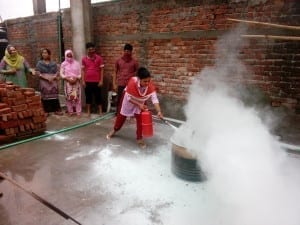
Thousands of garment workers have participated in the Solidarity Center’s 10-week fire safety certification course. Credit: Solidarity Center/Rakibul Hasan
Wages in Bangladesh are the lowest among major garment-manufacturing nations, even though the cost of living in Dhaka is equivalent to that of Luxembourg and Montreal. The country’s labor law falls far short of international standards, and the Bangladesh government has failed to enact meaningful legal reforms, including addressing the arbitrary union registration process that is vulnerable to employer manipulation. Without a union, garment workers often are harassed or fired when they ask their employer to fix workplace safety and health conditions.
But due to international action after the Rana Plaza disaster, which occurred months after a deadly fire at Tazreen Fashions Ltd. factory killed 112 mostly female garment workers, a variety of efforts to prevent unnecessary deaths and injuries due to fire or structural failures—including the Bangladesh Accord on Building and Fire Safety—have remedied dangers at more than 1,600 factories.
The Solidarity Center has trained more than 6,000 union leaders and workers in fire safety, helping to empower factory-floor–level workers to monitor for hazardous working conditions and demand safety violations be corrected.
Such international attention has opened up space for workers to collectively demand—and win—improvements on the job, says Monira.
“I am proud that we have been able to create leaders among the workers by organizing them into trade unions. In the past this would have been close to impossible.”
In Bangladesh, the Solidarity Center implements the Workers’ Empowerment Program – Components 1 and 2, which provides training and rights education to garment workers and organizers, with the support of USAID.
Iztiak, an intern in the Solidarity Center Bangladesh office, interviewed the worker-organizers in Dhaka.


 As an activist with the Tunisian General Federation of Railways, Barkallah was first elected as a deputy general secretary in 1983, heading up training within the union. She later was elected deputy general secretary in charge of international relations. In the railways industry, Barkallah was known as the “iron lady” for her determination and struggle to challenge her male colleagues in a male-dominated sector to achieve equality and justice for all.
As an activist with the Tunisian General Federation of Railways, Barkallah was first elected as a deputy general secretary in 1983, heading up training within the union. She later was elected deputy general secretary in charge of international relations. In the railways industry, Barkallah was known as the “iron lady” for her determination and struggle to challenge her male colleagues in a male-dominated sector to achieve equality and justice for all.

























